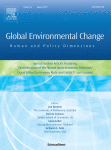Abstract
Climate journalism is a moving target. Driven by its changing technological and economic contexts, challenged by the complex subject matter of climate change, and immersed in a polarized and politicized debate, climate journalism has shifted and diversified in recent decades. These transformations hint at the emergence of a more interpretive, sometimes advocacy-oriented journalism that explores new roles beyond that of the detached conduit of elite voices. At the same time, different patterns of doing climate journalism have evolved, because climate journalists are not a homogeneous group. Among the diversity of journalists covering the issue, a small group of expert science and environmental reporters stand out as opinion leaders and sources for other journalists covering climate change only occasionally. The former group’s expertise and specialization allow them to develop a more investigative and critical attitude toward both the deniers of anthropogenic climate change and toward climate science.

Brüggemann, Michael (2017): Traditional and Shifting Roles of Science Journalists and Environmental Reporters Covering Climate Change. In Oxford Encyclopedia of Climate Change Communication. Available online at https://dx.doi.org/10.1093/acrefore/9780190228620.013.354.

